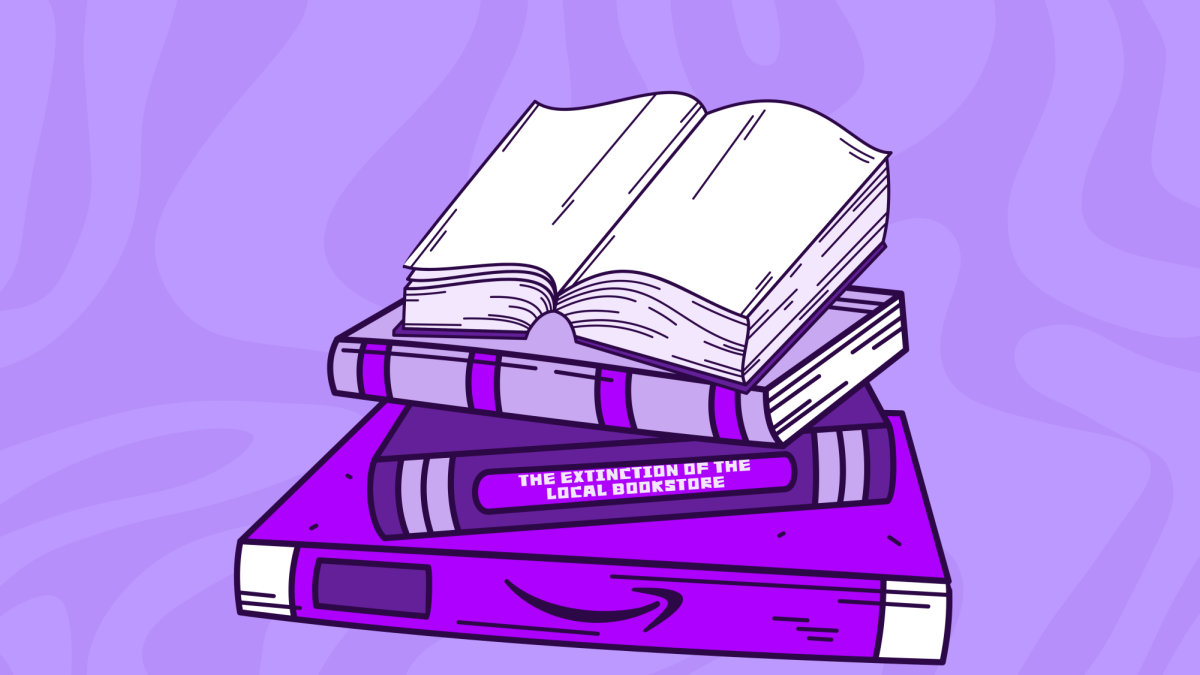Down any typical neighborhood street, the chances of stumbling upon an Amazon delivery truck are higher than ever before. Since Amazon’s launch in July of 1995 as an online bookseller, it has dominated the market in just about everything retail, from pillows to music to its original product: books. Jenny Carney, local business owner, calls the online retailer a monopoly “not just in tech, not just in retail, but so many different spheres.”
Carney knows this fact all too well. She and her wife are the co-founders and co-owners of Sidetrack Bookshop, a small, independent bookstore in Royal Oak. They hear negative comments from customers daily, all thanks to Amazon. “[Customers are] accustomed to two things as a result of Amazon: they want immediate shipping and delivery of anything in the world, and they want these ridiculously rock-bottom prices.” Both of these demands are offered by the online store. As a result, more and more customers are turning to Amazon for their book shopping.
This isn’t just talk. Small businesses feel this effect in a pretty significant way. According to Forbes, two out of three business owners say their growth is negatively affected by the online retailer. In fact, a 2022 study found that it has displaced over 136,000 shops in the United States.
Bookshops are affected more than most. Since the launch of Amazon, the number of local independent bookstores in the United States has plummeted more than 43%.
Co-owner of Paper Trail Books, another local bookstore in Royal Oak, is David Brown. He’s been in the bookselling business for years, working at a large, now-closed Borders bookshop in the early 2000s. Brown is familiar with the effect that Amazon can have on booksellers everywhere. “The bookstores in the past in fifteen years or so [have] gotten a lot smaller because, back in the ‘90s and the early 2000s, the bookstores were the only gang in town before Amazon. Now that there are so many other options, companies just can’t afford to have 50 employees, to have 40,000 square feet, so everything’s gotten a lot smaller.”
The impact of Amazon’s control goes beyond those running and working in bookstores. The company doesn’t create jobs: it destroys them. A study published in 2022 found that Amazon provided only half of the jobs that would have been provided if the small businesses displaced by the monopolistic retailer stayed open. That’s over 1.7 million jobs lost in the United States alone.
Furthermore, Amazon’s returns to the local economy are minute compared to those of small businesses. Small independent bookstore Between the Covers in Harbor Springs reports that 68% of the money spent at a small business stays in the local economy, while less than 43% of the money spent at companies like Amazon is returned to the local economy.
The same bookstore also reported that Amazon’s founder, executive chairman and former president Jeff Bezos had an annual philanthropic donation equivalent to the money he makes in a day. Between the Covers, by comparison, has annual philanthropic donations equivalent to the money they make in two months.
All of this doesn’t even touch on the racism, exploitation of workers and mass pollution allegations and convictions against the company. Supporting Amazon in turn supports the continuation of all these massive issues.
Understandably, though, Amazon’s low prices, quick shipping and extensive inventory are alluring, and sometimes even necessary. Brown admits to using Amazon to purchase office supplies for his store. “As a small business, you’ve gotta keep costs down.” He finds that the online retailer is the cheapest place to buy many things and that it makes more sense for the finances of Paper Trail Books to purchase items at their cheapest, even if that means supporting Amazon. “It hurts, but it also helps,” he admits.
Carney also recognized the appeal, calling the retailer “insidious.” But, she says, “Just don’t buy shit on Amazon. It’s a big hot mess that’s problematic.”
She explains that, while she doesn’t support Amazon in her position as a business owner, she also doesn’t support them morally. “Amazon’s a problem. They’re too powerful. They’re too big to fail. They can use their power in not-so-good ways. They’re exploiting their workers and nobody can do anything about it because they’re so powerful.”
Between the Covers leaves a final thought on the matter. “If your support of Amazon disrupts us into extinction, you are not threatening quaint old ways of doing business. You are threatening this place we all call home.”


